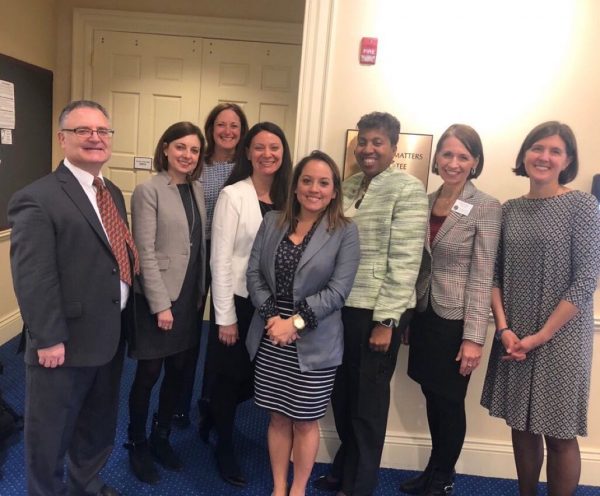All gifts, up to $10,000, TRIPLE-matched until June 30!
States Are Fighting for the Right to Decide — and Abortion Is Just the Start

The past several weeks, legislators across the country have been fighting to remove the structural barriers women face in deciding whether and when to have children and in raising a family. And they haven’t just been fighting against abortion restrictions; they have been working on tax codes and education and workplace policies because all of these play a crucial role in protecting our ability to decide whether and when to have children with dignity and autonomy and raise the families we have in a safe, healthy environment.
Fighting against abortion restrictions in Georgia
On Friday, Georgia passed H.B. 481, a law that would ban abortion as early as 6 weeks of pregnancy, before most women even know they are pregnant. Anti-abortion legislators pushed this bill through despite outcry, protests, and opposition from Georgians, including the medical community. When it was first considered in the House of Representatives, Georgia State Rep. Renitta Shannon spoke out against the abortion ban. During her testimony, her microphone was cut off and she was forced to leave the podium. Women have the right to decide if, when, and how they have their families and we are inspired by the brave actions of Rep. Shannon and all those in Georgia who are fighting for that right.

Maryland and Georgia are fighting for tax policies that work for women and families
Tax policies also impact women’s ability to decide if, when, and how they begin and raise families. Regressive tax codes that punish low- and middle-income families mean women have less money to make ends meet. But many state income tax codes include tax credits that help working families, that are based on federal tax credits. Even though the Trump administration’s 2017 tax law cut taxes for the wealthy rather than help the families who need it most, states continue to propose tax policies that work for women and families.

In Maryland, the Law Center submitted testimony in support of SB 870, a bill that would make Maryland’s Child and Dependent Care Tax Credit (CDCTC) refundable. This bill would enable low- and moderate-income families to access tax benefits to help them pay for the child care they need to work and that their children need to thrive and succeed.
And in Georgia, legislators and advocates are fighting for SB 41, a bill that would create a Georgia earned income tax credit (EITC). Refunds from tax credits like the federal and state EITCs supplement low wages to help women and their families pay bills, pay down debts, and save. They also help improve children’s well-being. Our Senior Counsel for State Policy, Andrea Johnson, was honored to be able to testify in support of this important bill alongside several partners, including the Georgia Budget and Policy Institute.
Preventing School Pushout in the District of Columbia
Access to schools that provide safe learning environments for all students is also an essential factor in being able to raise our families with dignity and autonomy and in safe and healthy environments. However, removing girls from school due to discriminatory dress codes interrupts their education, reinforces harmful racial and gendered stereotypes, and forces many parents to choose between missing a day of work and a paycheck or their child missing a day of class. Moved by the advocacy of Black girls affected by discriminatory dress codes and the recommendations in Dress Coded: Black Girls, Bodies, and Bias in D.C. Schools, the District of Columbia Council recently introduced a resolution urging D.C. public schools to work with students and parents to create equitable dress codes and discourage schools from removing students from the classroom for dress code violations. The resolution is an important step to disrupting school-pushout and protecting Black girls’ right to learn in D.C.
Creating Equitable Workplaces in Connecticut and Maryland
Workplace policies can also stand in the way of a women’s ability to decide whether, when, and how to raise a family by forcing women to choose between their job and a healthy pregnancy or caring for their children. That’s why in Maryland, we are fighting alongside Maryland advocates for HB 1107/SB 518, which will ensure that pregnant workers are entitled to reasonable workplace accommodations they might need to keep their pregnancy healthy, not just once a complication has arisen with their pregnancy.

And Connecticut is working to stop unpredictable work schedules that wreak havoc on working peoples’ ability to arrange for child care or meet other caregiving responsibilities. The Connecticut legislature is currently considering S.B. 764, which recognizes the burdens that everyone—and caregivers in particular—bear when their hours are cut with little notice and compensates them for the costs of those schedule changes. The bill would require certain employers to provide at least 72 hours’ notice of shifts and guarantee half time pay for any unworked hours when shifts are canceled or reduced with less than the required notice. Our Director of Job Quality, Julie Vogtman, submitted testimony in support of SB 764.
